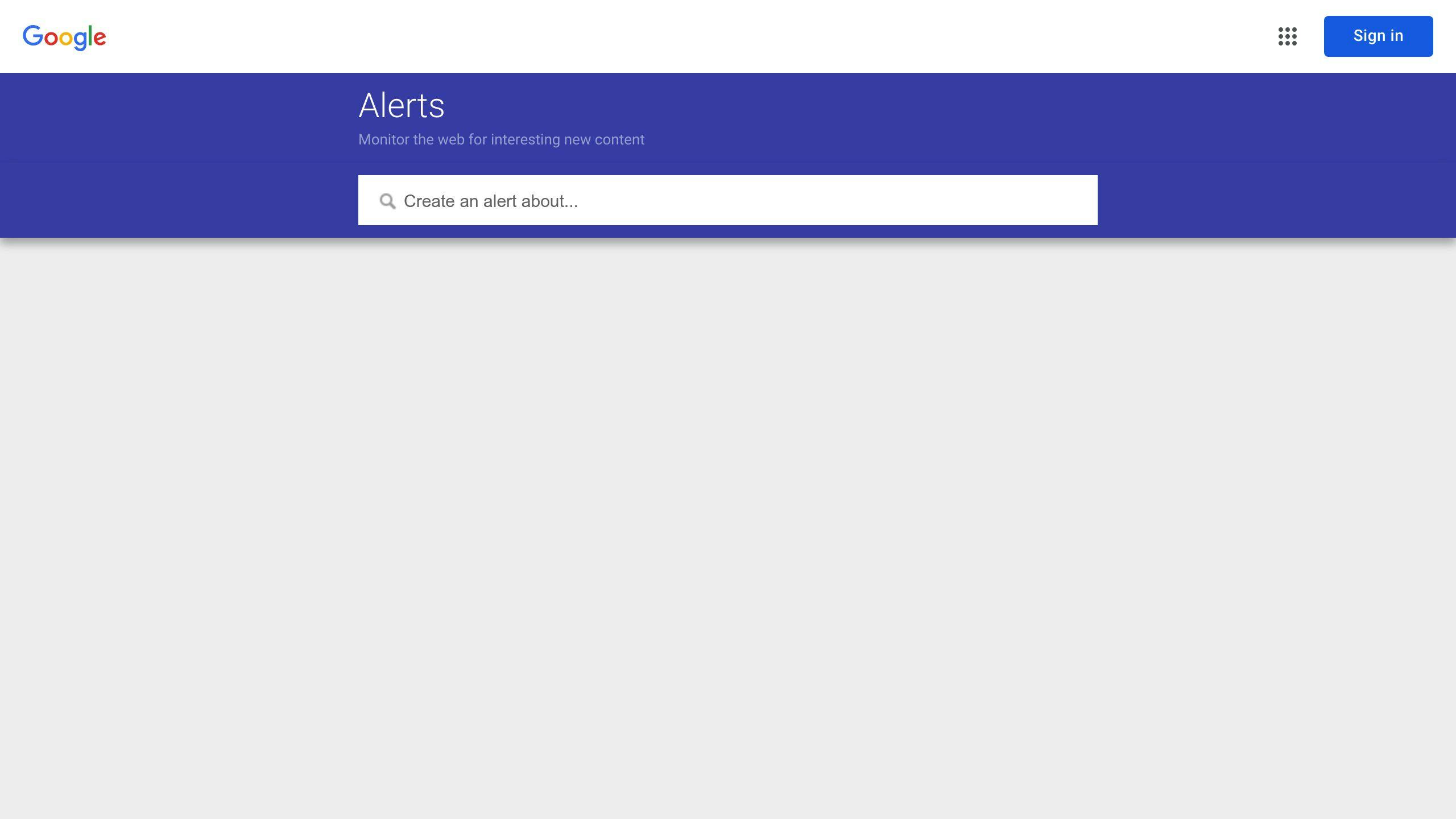Here's a quick guide to improve your online presence for job hunting:
- Optimize your LinkedIn profile
- Create a personal website/portfolio
- Use social media effectively
- Produce quality content
- Grow your online network
- Monitor and manage your online presence
| Tip | Key Actions |
|---|---|
| Add keywords, write strong summary, detail job achievements | |
| Website | Use full name in domain, keep design simple, optimize for mobile |
| Social Media | Maintain consistent branding, post industry content, use relevant hashtags |
| Content | Start a blog, write articles, guest post on industry sites |
| Networking | Connect on LinkedIn, join online groups, engage in discussions |
| Monitoring | Set up Google Alerts, review search results, update profiles regularly |
These steps will help you stand out to employers, showcase your expertise, and increase your chances of landing your dream job.
Related video from YouTube
1. Improve Your LinkedIn Profile

Make your LinkedIn profile easier to find by using the right words and giving more details about your work.
Add Key Words to Your Headline
Put words from your job field in your headline. This helps people find you when they search. Your headline should say:
- What you do
- Why people should connect with you
- How you can help them
For example: "Lead Consultant | Change Expert | Trainer for Small and Big Companies"
Write a Good Summary
Write about your biggest work wins and what you want to do next. Use words that your ideal employers would use.
Example: "I help small and big companies make more money in Africa through training and advice."
Make Your Job Descriptions Better
When you write about your past jobs:
- Use words from your job field
- Focus on what you achieved, not just what you did
Example: "As a Lead Consultant, I trained 50 companies. This helped them make 25% more money from their investments."
Add Skills and Get Others to Confirm Them
| Step | Action |
|---|---|
| 1 | Add skills that match the jobs you want |
| 2 | Ask coworkers to confirm these skills |
This shows employers you're good at what you do. Make sure the skills fit your job and ask people you've worked with to back them up.
2. Build a Personal Website or Portfolio
Create a website to show off your work and skills. This will help employers find you online.
Use Your Full Name in the Domain
Pick a website address with your full name. This makes it easier for people to find you when they search online.
Create a Simple, Professional Website
Make a clean, easy-to-use website that shows your work achievements and projects. You don't need to be a tech expert to do this. Use tools like Squarespace or Wix to build a good-looking site.
Use Job-Related Words
Put words related to your job throughout your website. This helps your site show up higher in search results. Add these words to your page titles, headings, and main text.
Make Your Site Work Well on Phones
Make sure your website looks good and loads quickly on phones and computers. This is important because many people use their phones to look at websites.
| Website Tips | Why It's Important |
|---|---|
| Use your full name in the web address | Makes it easier for employers to find you |
| Keep the design simple and professional | Shows your work in a clear way |
| Use words related to your job | Helps your site appear in search results |
| Make sure it works well on phones | Many people use phones to browse websites |
3. Use Social Media Effectively
Make your online presence strong across different social media platforms to help more people find you.
Keep Your Brand the Same
Use the same profile picture, bio, and way of talking on all your social media accounts. This helps people remember who you are.
Post About Your Job Field
Share things about your work area. This can be:
- News articles
- Your thoughts on work topics
- Helpful tips for others in your field
Doing this shows you know a lot about your job and can help you meet people who might want to hire you.
Use Job-Related Hashtags
Add hashtags that fit your job to your posts. This helps more people see what you share. Here's how to do it:
- Look for popular hashtags in your job area
- Add these hashtags to your posts
For example, if you work in tech, you could use #TechJobs or #JobSearch.
Keep Posts Work-Friendly
Remember that people who might hire you can see what you post. Here's what to do:
| Do | Don't |
|---|---|
| Share work-related content | Post personal arguments |
| Use polite language | Use bad words |
| Talk about your job skills | Share private information |
sbb-itb-b0d1ece
4. Create Quality Content
Making good content helps more people find you online and shows employers what you know. Here's how to do it:
Start a Blog
Writing a blog is a good way to show what you know. You can:
- Write on your own website
- Use sites like Medium
Write often about things you know well. This helps more people find you online.
Write Good Articles
Write articles that show you know your job well. Give new ideas and helpful information. This can make more people want to read what you write.
Write for Other Websites
Writing for well-known websites in your job area can help more people see your work. It shows you know a lot about your job to more people.
Use Job Words
Put words from your job in what you write. This helps people find your writing when they search online. But don't use too many job words. Just use them in a normal way.
| Content Type | Where to Publish | Benefits |
|---|---|---|
| Blog posts | Your website, Medium | Shows what you know, helps people find you |
| Articles | Industry websites | Reaches more people, shows you're an expert |
| Job-related words | All your writing | Makes it easier for people to find you online |
5. Grow Your Online Network
Building your online network can help you find more job chances. Here's how to do it:
Connect on LinkedIn
Use LinkedIn to meet work friends and people in your job field. Make sure your profile:
- Is complete
- Shows your latest work
- Lists your skills
This helps employers find you when they search.
Join Online Groups and Forums
Join groups about your job online. This helps you:
- Meet people who do the same work
- Learn new things about your job
- Share what you know
Take part in talks, give your ideas, and ask questions.
Comment on Job-Related Content
Add your thoughts to blogs and articles about your work. This shows you know a lot about your job. It also helps you talk to other people who do the same work.
Ask for and Give Job Recommendations
| Action | Benefit |
|---|---|
| Ask coworkers for recommendations | Shows others trust your work |
| Give recommendations to others | Helps build good work relationships |
Ask people who know your work well to write about your skills. This makes your online profile look better to employers.
6. Check and Manage Your Online Presence
Regularly check and manage what people can find about you online. This helps you keep a good image and show your skills to employers.
Use Google Alerts

Set up Google Alerts for your name and job-related words. This tells you when someone mentions you online. You can then:
- See what people are saying about you
- Fix any wrong information quickly
Look at Your Search Results
Check what comes up when you search your name. Make sure it looks good for jobs. Do this often to catch any problems early.
Fix Bad or Wrong Information
If you find something bad or wrong about you online:
- Act fast to fix it
- Show you care about your online image
This helps keep your reputation good for job searches.
Keep Your Profiles Current
Update your online profiles often. This shows you're active in your job field.
| What to Update | How Often | Why It's Important |
|---|---|---|
| LinkedIn profile | Every few months | Shows your latest skills and jobs |
| Personal website | When you have new work | Displays your most recent projects |
| Social media | Weekly or monthly | Keeps you visible in your field |
Conclusion
Now you know how to use personal SEO to help your job search and career. Using these 6 tips will make it easier for employers to find you online. Remember, you need to keep working on your personal SEO over time.
To get the most out of personal SEO:
- Check and fix your online presence often
- Make good content
- Talk to people in your field online
Doing these things will show off your skills and make you stand out to employers.
In today's world, having a good online presence is very important. If you follow the tips in this article, you'll build a strong online image that can help you get new jobs and move up in your career.
| Key Actions | Benefits |
|---|---|
| Update online profiles regularly | Shows current skills and experience |
| Create quality content | Proves your knowledge in your field |
| Engage with your network | Increases visibility to potential employers |
| Manage your online presence | Maintains a positive professional image |
Start working on your personal SEO today. If you keep at it, you'll be able to reach your career goals and do well in your job.
FAQs
What keywords should I put in my resume?
When making your resume, use words that match the job you want. Include both hard skills and soft skills:
| Skill Type | Examples |
|---|---|
| Hard Skills | Technical abilities specific to your job |
| Soft Skills | People skills that help you work well with others |
Here are some soft skills to consider:
- Teamwork
- Good communication
- Leadership
- Problem-solving
Remember to:
- Read the job post carefully
- Pick out key words from the job description
- Add these words to your resume where they fit
This helps your resume get noticed by both people and computer systems that look at resumes.

![5 Tips to Write Effective Recruiter Emails [Examples]](https://mars-images.imgix.net/seobot/shortfol.io/6642e05ac9d44b7d573b4a07-6b1b5bfede5c87f0271fb612a9b64fdd.png?auto=compress)
